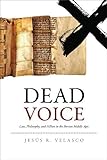Dead Voice : Law, Philosophy, and Fiction in the Iberian Middle Ages / Jesús D. Rodríguez-Velasco.
Material type: TextSeries: The Middle Ages SeriesPublisher: Philadelphia : University of Pennsylvania Press, [2019]Copyright date: ©2020Description: 1 online resource (256 p.)Content type:
TextSeries: The Middle Ages SeriesPublisher: Philadelphia : University of Pennsylvania Press, [2019]Copyright date: ©2020Description: 1 online resource (256 p.)Content type: - 9780812296716
- 349.4609023 23
- KKT142 1348 .R637 2020
- online - DeGruyter
| Item type | Current library | Call number | URL | Status | Notes | Barcode | |
|---|---|---|---|---|---|---|---|
 eBook
eBook
|
Biblioteca "Angelicum" Pont. Univ. S.Tommaso d'Aquino Nuvola online | online - DeGruyter (Browse shelf(Opens below)) | Online access | Not for loan (Accesso limitato) | Accesso per gli utenti autorizzati / Access for authorized users | (dgr)9780812296716 |
Frontmatter -- Contents -- Introduction -- One. Dead Voice -- Two. Vernacular Jurisdiction -- Three. Revenant Manuscripts -- Four. Legislating Friendship -- Five. Sensitive Souls -- Conclusion -- Notes -- Bibliography -- Index -- Acknowledgments
restricted access online access with authorization star
http://purl.org/coar/access_right/c_16ec
Conceived and promulgated by Alfonso X, King of Castile and León (r. 1252-1282) and created by a workshop of lawyers, legal scholars, and others, the set of books known as the Siete Partidas is both a work of legal theory and a legislative document designed to offer practical guidelines for the rendering of legal decisions and the management of good governance. Yet for all its practical reach, which extended over centuries and as far as the Spanish New World, it is an unusual text, argues Jesús R. Velasco, one that introduces canon and ecclesiastical law in the vernacular for explicitly secular purposes, that embraces intellectual disciplines and fictional techniques that normally lie outside legal science, and that cultivates rather than shuns perplexity.In Dead Voice, Velasco analyzes the process of the Siete Partidas's codification and the ways in which different cultural, religious, and legal traditions that existed on the Iberian peninsula during the Middle Ages were combined in its innovative construction. In particular, he pays special attention to the concept of "dead voice," the art of writing the law in the vernacular of its clients as well as in the language of legal professionals. He offers an integrated reading of the Siete Partidas, exploring such matters as the production, transmission, and control of the material text; the collaboration between sovereignty and jurisdiction to define the environment where law applies; a rare legislation of friendship; and the use of legislation to characterize the people as "the soul of the kingdom," endowed with the responsibility of judging the stability of the political space.Presenting case studies beyond the Siete Partidas that demonstrate the incorporation of philosophical and fictional elements in the construction of law, Velasco reveals the legal processes that configured novel definitions of a subject and a people.
Mode of access: Internet via World Wide Web.
In English.
Description based on online resource; title from PDF title page (publisher's Web site, viewed 27. Jan 2023)


